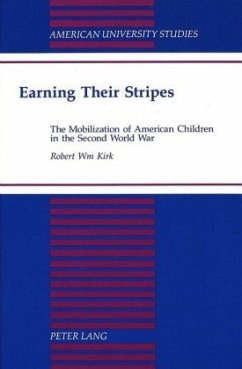The physical and emotional protection of American children during World War II challenged parents, child experts, and educators. The results of their responses to these challenges changed child rearing and education significantly. The vast army of 6- to 13-year-olds had critical social impact. These volunteers pulled wagon-loads of scrap, bought war bonds, planted victory gardens, and played war. Their experiences, along with constant anti-Axis propaganda, helped define them as a unique generation. Labeled the "silent" generation, they remain proud of their patriotism, loyalty, and team spirit. Beyond defining this generation, this work adds essential material to the study of the World War II home front.
"Robert W. Kirk describes the World War II childhood experiences of a segment of øthe middle! class and how exposure to domestic effects of that'good war' reinforced their traditional value structure. Perhaps we can't be precisely descriptive when we refer to the middle class as an amorphous whole. Kirk's study points us in the right direction by analyzing one of its parts and øby! tracing a major origin to its outcome." (Lawrence M. Goldstein, Sonoma State University)
"Robert Kirk's richly-detailed narrative of the mobilization of children on America's homefront during World War II calls our attention to a very significant moment in the history of childhood in American society. Through his well-researched, interpretive accounts of the efforts of both private groups and government agencies to recruit children for specific roles in wartime campaigns - from scrap collection to the selling of savings bonds - Kirk provokes us to consider the impacts on both children and parents ofthe temporary renewal of family and community relationships in which children seemed to play a necessary functional role... øKirk! sets forth an intriguing hypothesis about the connections between children's wartime service and their collective personality as the youth contingent of the postwar 'Silent Generation'. Whether readers turn to this book for new insights into the history of childhood or for an opportunity to relive wartime experiences, they will find much to enjoy and reflect upon in Kirk's readable study." (Roland Marchand, University of California, Davis)
"Robert Kirk's richly-detailed narrative of the mobilization of children on America's homefront during World War II calls our attention to a very significant moment in the history of childhood in American society. Through his well-researched, interpretive accounts of the efforts of both private groups and government agencies to recruit children for specific roles in wartime campaigns - from scrap collection to the selling of savings bonds - Kirk provokes us to consider the impacts on both children and parents ofthe temporary renewal of family and community relationships in which children seemed to play a necessary functional role... øKirk! sets forth an intriguing hypothesis about the connections between children's wartime service and their collective personality as the youth contingent of the postwar 'Silent Generation'. Whether readers turn to this book for new insights into the history of childhood or for an opportunity to relive wartime experiences, they will find much to enjoy and reflect upon in Kirk's readable study." (Roland Marchand, University of California, Davis)

